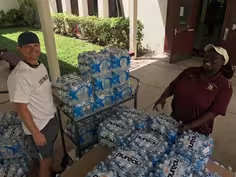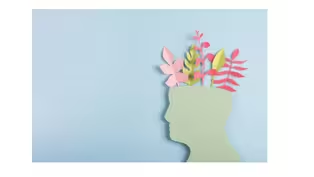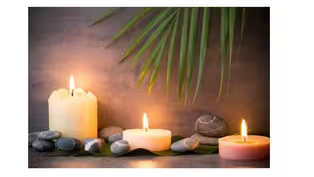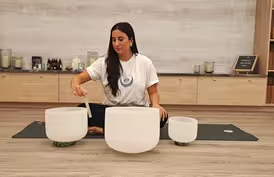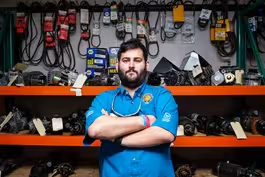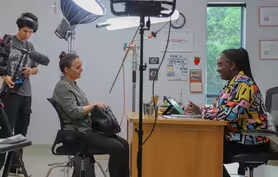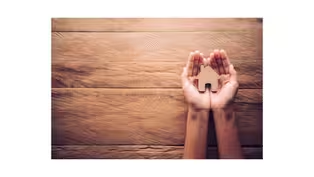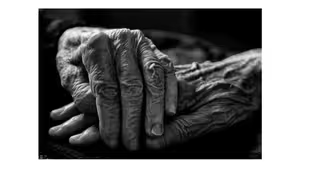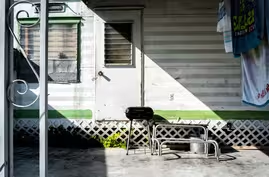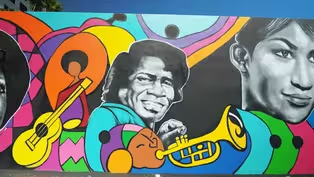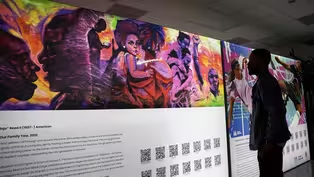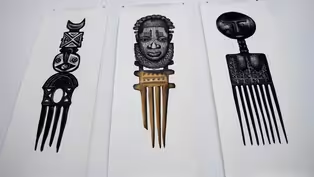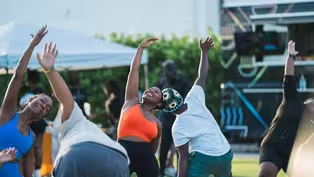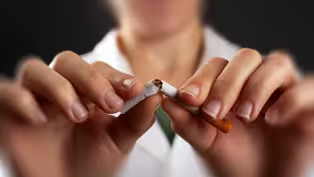Your South Florida
Overcoming Mental Health Challenges for Women in Midlife
Clip: Season 9 | 10m 20sVideo has Closed Captions
Arlene Borenstein sits down with 2 mental health leaders to discuss helping women navigate midlife.
Midlife is often called a "silent transition" — a time when women juggle career shifts, caregiving demands, physical changes, and identity struggles, often without support. In this conversation, Your South Florida host Arlene Borenstein sits down with two mental health leaders to talk about how local resources are helping women navigate this pivotal stage of life.
Problems playing video? | Closed Captioning Feedback
Problems playing video? | Closed Captioning Feedback
Your South Florida is a local public television program presented by WPBT
Your South Florida
Overcoming Mental Health Challenges for Women in Midlife
Clip: Season 9 | 10m 20sVideo has Closed Captions
Midlife is often called a "silent transition" — a time when women juggle career shifts, caregiving demands, physical changes, and identity struggles, often without support. In this conversation, Your South Florida host Arlene Borenstein sits down with two mental health leaders to talk about how local resources are helping women navigate this pivotal stage of life.
Problems playing video? | Closed Captioning Feedback
How to Watch Your South Florida
Your South Florida is available to stream on pbs.org and the free PBS App, available on iPhone, Apple TV, Android TV, Android smartphones, Amazon Fire TV, Amazon Fire Tablet, Roku, Samsung Smart TV, and Vizio.
Providing Support for PBS.org
Learn Moreabout PBS online sponsorshipWe're starting with midlife, a time that# can bring major transitions often silently.
To help us understand the unique mental# health challenges facing women in this stage and how to better support them, we're# joined by two experts: Katherine Murphy, CEO of NAMI Palm Beach County; and Shari Warner,# a licensed marriage and family therapist, and Founder of Serendipity Women's Mental# Wellness Center.
Thank you both for being here.
Thanks so much for having us.
Thanks for having us.
Of course.
Katherine, we'll start with you.# You deal with mental health challenges across all age groups.
Tell us what that looks like.# As we said, it's never one-size-fits-all.
So we serve people, generally 18 and up, but# a wide range of conditions and different life experiences.
All of our programs are# peer-led by people who understand what it's like to go through similar challenges.# We have support groups, classes, education, different presentations, just to try to reach# people where they're at across the lifespan.
So if we're looking at middle age, we offer a# lot of programs for people in that age range, including the support groups, wellness programs,# we have an incredible resilience training program.
Just a lot of different options for various# people on different stages in that journey.
And Shari, your center focuses# exclusively on women's challenges in midlife.
What inspired you to do# that?
And tell us a little bit more.
Well, our center actually works a lot with# women and adolescent girls and teens as well, but our focus on women's challenges through# midlife kind of came as a result of my own experience and being forced into surgical# menopause, and not understanding what I was facing.
And that led to me asking questions about# how other women are experiencing the same things; and if I had questions, how many other women# had questions as well.
And so we decided to put together programs and events that# would focus on situations that women experience during midlife, first and foremost# being menopause, the symptoms, experiences, behaviors, and the impact on their family.
Katherine, I know that you also deal a lot with caregivers.
That's right.
Women who are going Right.
Through these things, and they ha.. a stigma around this time of life, but imagine# also having to care for another human being.
Mmhmm.
So how do you approach that?
This is a majority of the people that we serve# as caregivers, and you might call it the sandwich generation Mmhmm.
Where you're taking .. and then also your aging parents.
And so a lot# of the people come to us, they feel alone in what they're going through because they're caring# for their family on both sides of that.
Mmhmm.
And then they might also not feel that same support any longer.
They# .. through at work with their colleagues, they might# be trying to live up to a certain presentation in their community, and might not feel comfortable# about the challenges that they're going through.
And so we try to offer a place where people# can come and just be authentic, and share about the different experiences that they're# having with other people who really get it.
Wow!
I bet the heaviness of that can often# propel like anxiety, depression.
They come in wanting help, not just for them, but also# because they're caring for others.
How does your organization help deal with that?
We have a support group every Wednesday night for the family caregivers of somebody# living with a mental health condition.
That support group's free, it's very easy to connect# with.
You just go to our website and you can sign up and really get that support right away.# And it's other family caregivers who understand what that experience is like.
They understand the# stigma, they understand the isolation.
A lot of times there can be shame or privacy or secrecy or# even just not knowing how to talk to somebody.
Ah!
But what it seems to happen is that once individuals start to talk# about what they're going through, the.. "Wow, you're going through that too."
Mmhmm.
And the more that you talk about and the more you# find out that everybody's going .. and it's okay to talk about it.
You're not alone.
You are not alone.
Definitely.
Wow!
Shari, your Serendipity Women's Mental Health Wellness# Center, I think I got that right.
What services do you provide in that same sense, and also# dealing with women in midlife that can help?
We currently offer primarily individual# services, so groups are wonderful, support groups are wonderful, there's unity in numbers,# but there are a lot of women who are feeling that sense of shame.
Mmhmm.
And they are not quite comfortable# speaking up about some of .. Hmm.
That they're experiencing in a gr.. theirs alone.
They're not at home with the family,# they're not sharing with others, they come into a space that they have said where they feel like,# "This is my space for the 45 minutes or an hour, and I don't have to think about anyone else but# me.
And I can say whatever it is I wanna say, I can say how I wanna say it, or I can sit and# say nothing because this is my space and my time, and this is a place for me to feel heard."
Something you mentioned is shame, and how do you deal with this?
How do different generations# of women going through these different things approach that, that some things are just# more taboo for certain generations than others.
How do you guys look at that and# help them through in different ways?
I think it's different based on who you# are and your upbringing, your background, the environment in which you were raised.
We# are all taught shame based on our culture, culture being family, culture being ethnicity,# culture being region.
And so what may be taboo or shameful for one may not be taboo or shameful# for another.
I like to work with women and go back to the source of the shame.
What was it that# transpired back in your childhood or your teenage years that made you feel that this particular# issue was something to be shameful about?
Hmm.
How has that impacted your life throughout?
How is it continuing to impact# your life today?
Let's work through that to .. you overcome shame Hmm.
So that you can continue to live the life that# you wanna live, how you wanna live it helping you become your best self, helping you heal.
How has NAMI Palm Beach County been seeing these numbers?
Are more women coming in for this# type of support?
What have you seen so far?
In general, we're seeing great increases in# the amount of people who are seeking help.
Be that therapy Mmhmm.
Or support groups, telehealth, there's a lo.. and destigmatizing around help-seeking.
[Arlene] Mmhmm.
We also see a lot of women who are the ones who# are reaching out for help and support.
So we've definitely seen our numbers increase in the# last couple of years.
During the Covid era, we saw a lot of people reaching out for the first# time, and I think we've really seen that continue.
People who maybe they weren't comfortable# reaching out for help and support in the past, I think that so much has been done to help# people feel like it is not your fault Mmhmm.
It's not a weakness of character, it's nothing that you've done to bring you to# this place, but it's okay to go and get support, and to reach out for help for it.
And there are peer-led programs where you have maybe women helping other women as# well to make it feel a little more normal.
Absolutely.
We have one group that's# specifically for the more mature ladies.
They meet every other week, and they have# lunch and they socialize, and they talk about the experiences that they have being# mature women, and how that's a bit unique.
Shari, you are an attorney.
[Shari] I am.
And so how does that help you with your therapist# career, and that end of the industry where people are coming to you with maybe emotional life# changes, but yet you can bring in this other knowledge you have to help with barriers# people are facing.
Tell us about that.
It has helped especially with the women in the# nonprofit at the center who are experiencing some sort of depression or anxiety symptoms as a# result of maybe a legal issue that they're facing.
So we've had women through the lifespan, whether# they're young women in their 20s going all the way up who are having anxiety or depression, or# just feeling dysregulated because they're going through a divorce Hmm.
Child custody issue, maybe a DUI, shoplifting,# whatever it is that they've gone through, and they don't understand the legal process.
And# so my background in law kind of helps to placate them a little bit Yeah.
In terms of being able to give some cla.. and how they can navigate the process.
The more# information they have, the less anxiety they have.
Once we reduce the anxiety, then we can help# them by working with them through whatever other issues they're experiencing.
So that's where# my legal background has come in.
Also on the administrative side, being a lawyer, I've worked# in different areas of the law as a litigator, I've worked as a transactional attorney,# real estate.
And so all of that background comes together in building the organization,# so that it's solid, and it can do what it needs to do for the women who come to us.
Katherine, there are women who are silently struggling, what would be your message# to them?
Where would be the best way to take their first step?
And how to take that# first step?
How would you encourage them?
One incredible resource that we have is the 988# helpline.
So 24 hours a day, wherever you are, you can call 988 from anywhere in the country and# get connected to immediate support.
And whether you're in Palm Beach County or in Hmm.
Another county in Florida, or you're anywhere# in the country, you can call that number and get help right away, and then they can# connect you to local resources.
With NAMI, we're a national organization, there's# over 600 NAMIs throughout the country.
Yeah.
So it's very easy to get connected to a local NAMI, and then we can# he.. And it may or may not be something that we offer# at our NAMI, it might be referring to a local partner, helping people to find the right type of# treatment or right type of resource for them.
Wow!
Thank you so much.
Yeah.
And Shari, what about you?
How would you encourag..
Call us at Serendipity, we are available,# and we're here to help you.
And the fact that you're picking up the phone and making that# call tells us that you have reached that point where you're tired of being tired, and you're# ready for help, and we're here to help.
Thank you guys so much for being here and# encouraging women to just step forward, right, and get the help they need.
Mmhmm.
Katherine, Shari, thank you so much.
Stronger Together: Helping Families Prepare for Storms
Video has Closed Captions
Clip: S9 | 6m 49s | Broward Cares is a disaster relief partnership that is helping families during and after storms. (6m 49s)
Inspiring the Next Generation of Climate Leaders at MODS
Video has Closed Captions
Clip: S9 | 8m 12s | Young people are discovering their power to protect the planet. (8m 12s)
Designing for a Changing Climate at FAU CES
Video has Closed Captions
Clip: S9 | 11m 44s | Researchers and designers at FAU are building resilience through nature. (11m 44s)
Overcoming Mental Health Challenges for Women in Midlife
Video has Closed Captions
Clip: S9 | 10m 20s | Arlene Borenstein sits down with 2 mental health leaders to discuss helping women navigate midlife. (10m 20s)
Low Cost Mental Health Support for All Ages at Faulk Center
Video has Closed Captions
Clip: S9 | 9m 33s | Mental health challenges can affect anyone. (9m 33s)
Free College Mental Wellness Support from Beyond Grey
Video has Closed Captions
Clip: S9 | 7m 10s | Many college-aged young adults struggle to access mental health support. (7m 10s)
Teaching Every Child to Swim and Protecting Those Most at Risk
Video has Closed Captions
Clip: S9 | 7m 4s | Children with autism are 160 times more likely to drown than their neurotypical peers. (7m 4s)
How The de Moya Foundation Helps Young Adults with Special Abilities Thrive
Video has Closed Captions
Clip: S9 | 11m 58s | 85% of autistic adults are unemployed or underemployed, often due to limited workplace support. (11m 58s)
How Theater Helps Young Adults on the Spectrum Find Their Voice
Video has Closed Captions
Clip: S9 | 7m 6s | For many people on the spectrum, the arts can be a powerful outlet for communication and creativity. (7m 6s)
Why South Florida Seniors Are Struggling to Keep Their Homes
Clip: S9 | 10m 32s | Rising condo fees, unexpected assessments, and stricter building regulations are impacting seniors. (10m 32s)
How 211 Broward is Helping Seniors in Crisis
Clip: S9 | 8m 52s | South Florida seniors are struggling with housing, food, healthcare and social isolation. (8m 52s)
The Disappearing Mobile Home Parks of South Florida
Clip: S9 | 7m 41s | Once a staple of affordable housing, mobile home parks in South Florida are rapidly disappearing. (7m 41s)
Street Art Revolution: Transforming West Palm Beach with Black History & Culture
Video has Closed Captions
Clip: S9 | 5m 57s | In West Palm Beach, Black history isn’t just celebrated in February—it’s honored year-round. (5m 57s)
Miami MoCAAD: Bringing Black History to Life Through Art & Technology
Video has Closed Captions
Clip: S9 | 9m 37s | In this segment, we explore Miami MoCAAD’s latest exhibit—a powerful multimedia experience. (9m 37s)
Anthony Burks Sr: A Passion for Art, Culture & Community
Video has Closed Captions
Clip: S9 | 9m 28s | Florida-based artist Anthony Burks has been creating art his whole life. (9m 28s)
Mindful Eating Made Simple: Hearty Lentil & Vegetable Stew Recipe
Video has Closed Captions
Clip: S9 | 9m 29s | Living a mindful and balanced life includes cultivating a healthy relationship with food. (9m 29s)
Meet the Black Yogis Creating Safe Spaces for Wellness & Unity
Video has Closed Captions
Clip: S9 | 8m 27s | Yoga is a transformative practice but access to inclusive, welcoming spaces remains a challenge. (8m 27s)
3 Steps to Breaking Habits Through Mindfulness
Video has Closed Captions
Clip: S9 | 9m 47s | We explore how mindfulness can play a transformative role in in breaking harmful habits. (9m 47s)
Providing Support for PBS.org
Learn Moreabout PBS online sponsorshipSupport for PBS provided by:
Your South Florida is a local public television program presented by WPBT
